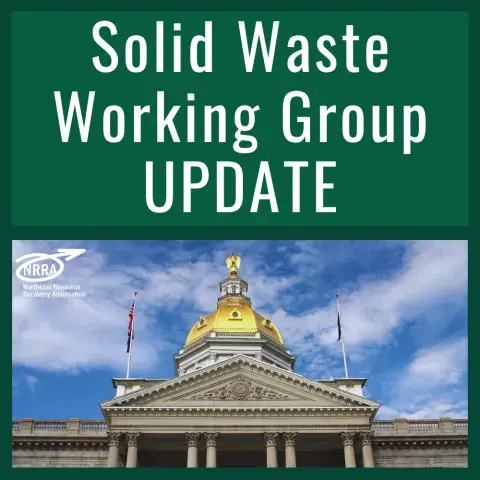
June’s Solid Waste Working Group meeting included an update on new food waste-related grants for municipalities, private entities, and businesses, an update about the NHDES Solid Waste Management Bureau’s work, and a presentation by NHDES about managing sludge and biosolids.
Representative Karen Ebel provided an update regarding legislation related to solid waste management. The most important update for NRRA members is that HB 462—which made an appropriation to the solid waste management fund targeting food waste reduction and diversion—was incorporated into the budget signed by the Governor. As a result, NHDES will be hiring a new full-time position to administer the Solid Waste Management Fund and issuing grants to municipalities, private entities, and businesses for projects that will “provide a demonstrated, significant improvement in waste diversion methods and contribute to a reduction of wastes, including hazardous waste materials, requiring disposal, including a regional or municipal materials recovery facility operated by a public or private entity, and other regional recycling efforts.” Half of the initial $1M will be reserved for food waste projects.
Based on initial fiscal estimates NHDES provided when HB 462 was first proposed, NHDES is assuming that the first round of grants would commence around July 2024.
Mike Wimsatt, Director of the Waste Management Division at NHDES, provided some updates regarding the NHDES Solid Waste Management Bureau. He confirmed that NHDES will be receiving an EPA grant in the amount of $572,000 over a three-year period. This is the first time in its history that NHDES has received an EPA grant for solid waste management, so this development is significant for solid waste management in NH.
The funds will be used for (1) a waste characterization study; (2) a food waste generation study; and (3) educational resources and technical assistance for recycling and waste diversion. In addition, the Bureau has two new initiatives in the works: a new program to provide technical assistance to colleges and universities, and a new recycling website for residents.
Finally, Anthony Druin, Residuals Management Supervisor from NHDES Wastewater Engineering, presented about sludge and biosolids and the challenges with PFAS in both. Sludge is the residual, semi-solid material that is produced as a byproduct during sewage treatment of industrial or municipal wastewater. Biosolids refers to treated sewage that has been treated to meet EPA requirements for land application as fertilizer.
In NH, sludge is not treated, has no significant testing, no certification, and can only be landfilled or incinerated. On the other hand, in NH biosolids are treated, tested extensively, and are certified by NHDES for beneficial use for land application as fertilizer. Approximately 40% of sludge produced in NH is recycled to biosolids, and paper mills are an example of businesses that produce a large quantity of sludge and biosolids. NHDES is testing biosolids in NH for the presence of PFAS while working on standards for biosolids to ensure they can continue to be used safely on farmland.
